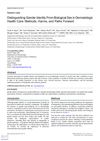 29 citations,
March 2019 in “British Journal of Dermatology”
29 citations,
March 2019 in “British Journal of Dermatology” Acne is significantly influenced by genetics, and understanding its genetic basis could lead to better, targeted treatments.
 13 citations,
December 2008 in “Veterinary dermatology”
13 citations,
December 2008 in “Veterinary dermatology” A rabbit with sebaceous adenitis was effectively treated with ciclosporin and medium-chain triglycerides.
 1 citations,
January 1989 in “Journal of dermatological treatment”
1 citations,
January 1989 in “Journal of dermatological treatment” Azelaic acid may help treat acne by killing bacteria, reducing inflammation, and preventing clogged pores.
 47 citations,
May 2021 in “Polymers”
47 citations,
May 2021 in “Polymers” Jojoba oil is highly valued for its diverse medicinal and industrial uses.
 28 citations,
September 2013 in “Expert Opinion on Therapeutic Patents”
28 citations,
September 2013 in “Expert Opinion on Therapeutic Patents” New resveratrol-related compounds show promise for treating various health issues but need more research for clinical use.
 10 citations,
January 2016 in “Dermatology”
10 citations,
January 2016 in “Dermatology” Psoriasis lesions have fewer and smaller oil glands, which might affect the condition's development.
 3 citations,
November 2015 in “Journal of Investigative Dermatology”
3 citations,
November 2015 in “Journal of Investigative Dermatology” Testosterone can both promote hair growth and cause baldness by affecting hair growth signals.
 May 2024 in “Aktualʹnì problemi sučasnoï medicini: Vìsnik Ukraïnsʹkoï medičnoï stomatologìčnoï akademì”
May 2024 in “Aktualʹnì problemi sučasnoï medicini: Vìsnik Ukraïnsʹkoï medičnoï stomatologìčnoï akademì” Spironolactone and clascoterone are promising acne treatments with fewer side effects.

Accurate gender and sex assessment in dermatology is essential for respectful and precise patient care.
 January 2018 in “Elsevier eBooks”
January 2018 in “Elsevier eBooks” The document explains how male reproductive hormones work and affect the body.
 October 2013 in “Springer eBooks”
October 2013 in “Springer eBooks” PCOS is a hormonal disorder causing infertility and menstrual problems, often linked to obesity and can lead to acne, treated with hormonal and insulin-sensitizing medications.

research Acne
58 citations,
January 1997 in “Dermatologic Clinics” Acne significantly affects mental health and quality of life, with research suggesting hormonal and genetic factors in its development and emphasizing early treatment to prevent scarring.
 42 citations,
July 2015 in “Journal of The American Academy of Dermatology”
42 citations,
July 2015 in “Journal of The American Academy of Dermatology” The conclusion is that oral contraceptives and antiandrogens can treat hirsutism and acne in women with cutaneous hyperandrogenism, but more research is needed for effective treatments, especially for hair loss.
 42 citations,
February 1985 in “Journal of the American Academy of Dermatology”
42 citations,
February 1985 in “Journal of the American Academy of Dermatology” Excessive hair growth can be assessed by history, exam, and blood tests, and treated with medication like dexamethasone, birth control pills, and spironolactone.
 25 citations,
June 2018 in “Journal of The American Academy of Dermatology”
25 citations,
June 2018 in “Journal of The American Academy of Dermatology” Genes linked to fibrosis are more active in people with central centrifugal cicatricial alopecia.
 16 citations,
November 2020 in “International journal of pharmaceutics”
16 citations,
November 2020 in “International journal of pharmaceutics” Using longer PEG chains helps nanoparticles penetrate hair follicles better, improving drug delivery for conditions like alopecia.
 13 citations,
January 2010 in “Advances in Biochemical Engineering / Biotechnology”
13 citations,
January 2010 in “Advances in Biochemical Engineering / Biotechnology” Understanding hair biology is key to developing better treatments for hair and scalp issues.
 10 citations,
January 2017 in “Expert Opinion on Pharmacotherapy”
10 citations,
January 2017 in “Expert Opinion on Pharmacotherapy” The conclusion is that more research is needed to better understand and treat adult acne, and that patient education and simple treatment plans are important for better results.
 6 citations,
August 2009 in “Mini-reviews in Medicinal Chemistry”
6 citations,
August 2009 in “Mini-reviews in Medicinal Chemistry” Different drugs can treat high male hormone levels in women, but they have various effects and some may harm a fetus.
 4 citations,
January 2022 in “Current pharmaceutical design”
4 citations,
January 2022 in “Current pharmaceutical design” Microsponges delivery system is a safe, versatile method for controlled drug release in various treatments.
 1 citations,
January 2014 in “Springer eBooks”
1 citations,
January 2014 in “Springer eBooks” Adult acne is more common in women, often linked to hormones, and can be harder to treat.
 November 2023 in “Berkala Ilmu Kesehatan Kulit dan Kelamin/Berkala ilmu kesehatan kulit dan kelamin (Periodical of dermatology and venerology)”
November 2023 in “Berkala Ilmu Kesehatan Kulit dan Kelamin/Berkala ilmu kesehatan kulit dan kelamin (Periodical of dermatology and venerology)” A dermoscope helps accurately tell apart Pityrosporum folliculitis and Acne vulgaris.
 2 citations,
January 2014 in “Springer eBooks”
2 citations,
January 2014 in “Springer eBooks” Polycystic Ovary Syndrome (PCOS) often leads to severe acne, and lifestyle changes and hormonal treatments can help manage it.
 April 2020 in “International Journal of Research in Dermatology”
April 2020 in “International Journal of Research in Dermatology” Scalp skin conditions are more common in young adults and teenagers, especially males, with itching being the main complaint. The most common conditions are psoriasis and alopecia areata, and these can significantly affect a person's social life due to their psychological impact.
221 citations,
July 2012 in “Proceedings of the National Academy of Sciences of the United States of America” BMAL1 controls skin cell growth and UV damage risk, peaking at night.
 39 citations,
January 2013 in “Indian Journal of Dermatology, Venereology and Leprology”
39 citations,
January 2013 in “Indian Journal of Dermatology, Venereology and Leprology” Eating high glycemic foods and drinking milk may worsen acne by increasing insulin and IGF-1 levels.
 7 citations,
July 2019 in “International archives of internal medicine”
7 citations,
July 2019 in “International archives of internal medicine” Common skin conditions can greatly affect a person's mental health and social life.
 March 2024 in “Journal of Microbiology and Biotechnology”
March 2024 in “Journal of Microbiology and Biotechnology” Phloroglucinol may help improve hair loss by promoting hair growth and reducing oxidative stress.
 January 2023 in “Journal of cosmetic dermatology”
January 2023 in “Journal of cosmetic dermatology” The synthetic retinoid EC23 thickens skin and promotes hair growth more effectively and with a lower dose than natural retinoids.

The ketogenic diet might improve certain skin conditions, but more research is needed to confirm its effectiveness.





























